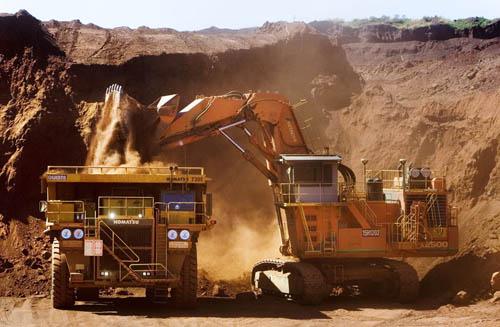
A load and haul iron ore operation in the Pilbara
<small>Copyright © 2009 Rio Tinto</small>
What are some of your major pain points/challenges as CIO?
With the commission of our Operations Centre, communications infrastructure became a piece of critical infrastructure in a way that had not been in the past. From time to time we experience communications faults, generally through something impacting the fibre optic network, and whereas in the past these may have been an inconvenience, these now stop production. This has forced a rapid maturity of these systems, which is not common in the resources industry.
With such a rapid expansion, it has also been critical to remain ahead of construction. Project teams have a habit of delivering their own solutions where none already exist, so we seek engage early and comprehensively with any initiative that features technology.
Do you face any issues re: dealing with a distributed/remote workforce? How do you overcome these?
Our business attracts an increasingly connected generation that live and work in different locations. While they’re at our work sites, they expect to remain connected to their friends and families at work and in their free time. Social media, mobile phone connectivity, the quality of in-room digital systems and availability of tools like Skype are becoming increasingly important, and provision of these forms part of our strategic and operational plans – no simple feat in the Pilbara. Providing the communications infrastructure and support for these systems is a key operational challenge.
Do you have an opinion on centralised versus decentralised IT?
We maintain a hybrid model in our business. There is a necessity for some aspects of our IT delivery to be core and standardised across the enterprise, including configuration of our ERP and a tight control over the design and monitoring of our network. Some aspects are best delivered as close to our operational teams as feasible, such as triage of control systems and delivery of complex applications projects. We seek to balance the benefits of leveraging scale for improved efficiency of standardised services, with the benefits of direct operational control. We have mostly centralised - we centralise services for which we can leverage scale and skill, or for which our operations have little interest in running.
To what extent are mobile technologies critical to your workforce?
We have a degree of infield data capture and mobile computing, but in most cases our people must return to their desk to action maintenance and operational issues identified in-field. Mobile technologies are an area we have looked to other industries for inspiration. There is a great opportunity to untether our workforce from their PCs. The Oil & Gas and Logistics industries show what is possible in this field.
Read Part 1 of this interview.
There’s also an opportunity to mine the information we already collect, particularly location of fixed and mobile assets, to provide better information to mobile teams. There is some very promising work in the utilities and transmission industries extending on the work of Google in developing augmented reality solutions. Alongside, the breakneck pace of development in smartphone and tablet platforms, and their prevalence in the retail market, mean everyone from graduates to board members are demanding the same thing, “How can I do that on my iPad?”
What do you see as the particular advantages of working as a CIO in the resources sector?
The resources industry has held an enviable position in this economic cycle with demand for product remaining strong throughout. While many other industries have had a primary focus on cost reduction, we have expanded and our stakeholders have moved from viewing IT as an overhead cost to recognising technology solutions as a key enabler of business value.
What do you see as the particular challenges of working as a CIO in the resources sector?
Because of the remote nature of our business, CIOs in resources must cover an enormous breadth of business process – for me, this includes mine, port, rail, utilities, accommodation and corporate systems. There aren’t too many dull days and there’s usually something in dire need of attention. There’s also a finite number of project managers, business analysts and communications technicians with deep experience in those domains. We’re seeing acute shortages of certain skills in Western Australia, where mining, oil and gas and consulting services all compete for the same people.
What’s next for the company? Where do you foresee IT being able to take the business tomorrow?
Rio Tinto’s Iron Ore division will continue its rapid expansion. We will continue to use technology to improve safety, to provide the connectivity for our people, our equipment and their supporting systems, and to leverage the integrated nature of the business to provide optimisation across our supply chain.
Reflecting on other industries, I feel we need to get better at mining our own data. As an asset intensive business, we record everything, yet we barely scratch the surface of using this trove to gain business insights, to expose issues, to predict failure, or to provide solid decision support. That challenge is fertile ground for our years ahead.
Read Part 1 of this interview.
Join the CIO Australia group on LinkedIn. The group is open to CIOs, IT Directors, COOs, CTOs and senior IT managers.
